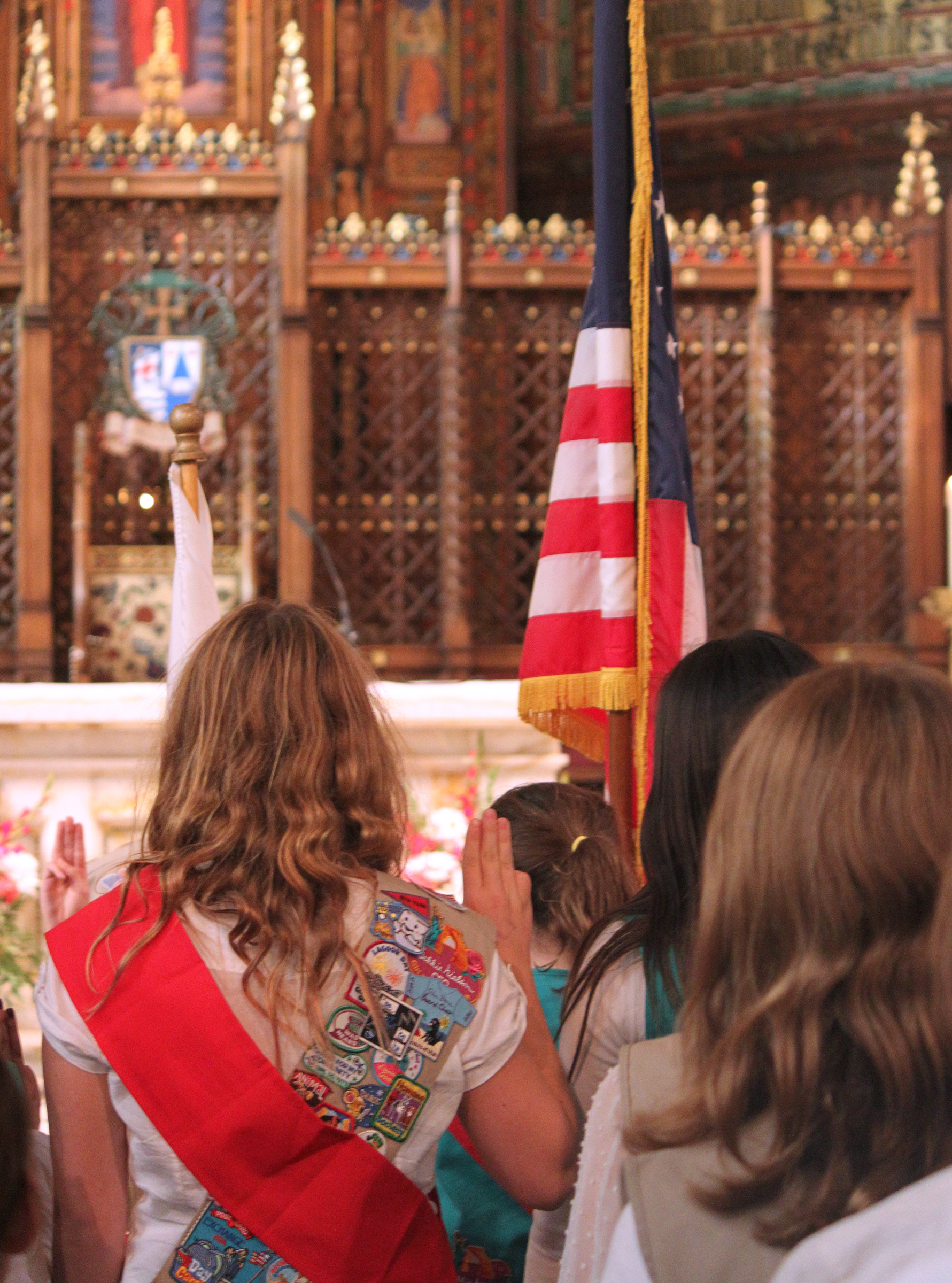


Last Monday, May 1, 2017, the Archdiocese of Kansas City, Kan., issued a statement explaining its decision to cut ties with the Girl Scouts. The archdiocese plans to transition from an affiliation with the Girl Scouts of the United States of America to a Christian program, the American Heritage Girl, adding to the politically charged saga between the Girl Scouts and the church. For decades, the Girl Scouts have been subject to criticism for what some take to be the organization’s liberal positions on sexuality, birth control and abortion and for its promotion of the work of pro-choice feminists such as Betty Friedan, Margaret Sanger and Gloria Steinem. Officially, Girl Scouts USA takes no stance on issues related to sexuality, birth control or abortion. In addition, the Girl Scouts have a general policy of inclusion, meaning they allow the participation of L.G.B.T. youth and troop leaders, which has caused some controversy as well. Despite recent criticism, the Girl Scouts boasts of its relationship with the Catholic Church on its website. Of the organization’s 3.2 million members, which includes both scouts and volunteers, 500,000 were Catholic as of 2013. World Association of Girl Guides and Girl Scouts In recent years, Girl Scouts USA has come under particular scrutiny for its association with organizations whose missions conflict with church teaching. This includes past partnerships with organizations like Amnesty International, Oxfam and Doctors Without Borders. (Both Oxfam and Doctors Without Borders provide contraception to aid recipients. Oxfam supports access to safe abortion services, and Amnesty International and Doctors Without Borders condone abortion in cases of rape.) The Girl Scouts boasts of its relationship with the Catholic Church on its website. The primary source of concern for Catholic officials has been the Girl Scouts’ affiliation with the World Association of Girl Guides and Girl Scouts (WAGGGS). Several outlets have published articles linking WAGGGS to pro-choice organizations like International Planned Parenthood and exposing its members’ efforts to promote sexual health and reproductive rights. WAGGGS has acknowledged that through some of its member organizations, as well as in its own communications, it has advocated for women’s “sexual and reproductive health/rights.” The organization emphasizes its dedication to the well-being of marginalized girls and it takes no stance on abortion, but WAGGGS has limited authority over the positions of its member organizations and the personal positions of its delegates. Likewise, Girl Scouts USA has a neutral stance on sexuality, contraception and abortion, but it allows individual councils or troops to take positions on these topics if parental consent and other necessary permissions have been obtained. Girl Scouts USA has said that it is unable to distance itself from WAGGGS or to change any of the organization’s advocacy positions. It contributes over $1 million to WAGGGS each year. According to the Girl Scouts USA website, this money comes from investment income, rather than from revenue generated by troops through dues, cookie sales and registration fees. An incident in 2010 brought attention to Girl Scouts USA’s controversial affiliation with WAGGGS. A brochure titled “Healthy, Happy and Hot,” created by International Planned Parenthood, was found in a room after a meeting of the U.N. Commission on the Status of Women, at which a delegation of 10 girl scouts were representing WAGGGS. The brochure describes how to have a sex life when H.I.V.-positive and promotes both birth control and abortion. Girl Scouts USA claimed to have had no knowledge of the brochure. Following this incident, pro-life advocates asked the Girl Scouts to disassociate from WAGGGS, after which point mention of Girl Scouts’ participation with the U.N. event was removed from event materials. Over the course of the last two decades, similar concessions have been made to pro-life and religious members of Girl Scouts USA, including the rephrasing of problematic material in the group’s curricula. American Heritage Girls The American Heritage Girls was founded in 1995 by the former Girl Scout troop leader Patti Garibray. She decided to form an alternative group for girls in 1993 after the Girl Scouts altered their Girl Scout Promise to make a reference to God optional and to allow the substitution of a different term (Allah, the Creator, etc.) that better suits a scout’s spiritual beliefs. The organization has grown quickly over the past 20 years and now has groups across the country. Its 1,000th group started last January. This faith-based, scouting-type program is an option for Catholics looking to move away from Girl Scouts USA. However, even this program may not align entirely with Catholic teaching. Its “7C’s of History” badge suggests girls take a trip to the Creation Museum in Petersburg, Ky., which denies evolution. Pope Francis, in agreement with St. John Paul II and Pope Benedict XVI, asserted the possibility of both evolution and the big bang in a speech to the Pontifical Academy of Sciences in 2014. Catholic disapproval In 2012 Bishop Kevin Rhoades of Fort Wayne, chairman of the U.S. Conference of Catholic Bishops’ Committee on Laity, Marriage, Family Life and Youth, launched an official inquiry into Girl Scouts USA and Catholic scouting. The inquiry seems to have been spurred on by the group’s links to organizations that differ from church teaching, especially its association with WAGGGS. In February of that year, the five-part series “Girl Scouts: Mission Aborted,” which rebuking the Girl Scouts’ ties to Planned Parenthood, ran on EWTN. "Does one policy with which you can’t agree prevent you from being involved in broader coalitions?" Several former girl scout leaders, disheartened by what they saw as unconvincing neutrality on the part of the Girl Scouts, began blogs to reveal the ways the organization was failing its girls, including “Girl Scouts, Why Not?,” “100 Questions for the Girl Scouts” and “mygirlscoutcouncil.com.” Popular blogs for Catholic women, like “Women of Grace” likewise began assailing Girl Scouts USA for its connection to pro-choice organizations. Activists have used social media campaigns to boycott Girl Scout cookie sales. Under pressure from parents, some Catholic parishes began disassociating with the Girl Scouts, disbanding troops and refusing the use of parish space for meetings. Because of the grassroots nature of the resistance to Girl Scouts USA, it is hard to gauge the size of the movement. Some Catholic leaders have expressed public support for Girl Scouts. Robert McCarty, former executive director of the National Federation for Catholic Youth Ministry, told The Washington Post: “It’s the whole thing of guilt by association. Does one policy with which you can’t agree prevent you from being involved in broader coalitions? My position is that the only way you can advocate for the church’s position is to be engaged in the dialogue.” He also suggested that any perceived violations of the Girl Scouts were unintentional and were usually rectified. “I don’t think any of this material was intentionally mean-spirited,” Mr. McCarty told the Associated Press. “I think a lot of it was lack of attention.” On April 2, 2014, the United States Conference of Catholic Bishops issued a report resulting from its inquiry, in which they cited WAGGGS’s support of “sexual and reproductive health/rights” as a problematic aspect of Girl Scouts’ current affiliation with the international organization. The Committee on Laity, Marriage, Family Life and Youth “recognized to be morally objectionable any type of promotion, advocacy, or education on ‘sexual and reproductive health/rights’ as this phrase is commonly understood, especially since the phrase often includes abortion.” The report suggested that concerned parents discourage their girl scouts from participating in WAGGGS events and fundraising and stated that individual girl scouts can choose not to wear their WAGGGS pins. Moreover, the committee urged clear communication and strong parental involvement at the local level. They suggested that, instead of associating with WAGGGS, “troops might encourage prayer for girls and young women around the world” and “propose concrete initiatives and projects of service and solidarity” that work to affirm “the authentic dignity and vocation of women.” Overall, the committee report stated that the bishop conference’s interactions with the Girl Scouts were “pleasant, informative and respectful,” and the report left any broad policy recommendation regarding future association with Girl Scouts USA to the local bishops. On Feb. 18, 2016, Archbishop Robert Carlson of St. Louis created the Catholic Committee for Girls Formation. In a letter to priests, scout leaders and other Catholics, Archbishop Carlson urged a severance from the Girl Scouts, which he said promotes values that conflict with church teaching. He intended for the committee to demonstrate “ongoing commitment to educating and forming all young women.”
RELATED STORIES

This brings us to May 1, 2017, when Archbishop Joseph F. Naumann of Kansas City, Kan., made public his decision to transition his archdiocese from Girl Scouts USA to the American Heritage Girls. In his letter, Archbishop Naumann explained that this difficult decision was based on hundreds of hours of research. He described Girl Scouts USA’s financial contributions to WAGGGS as well as the organization’s use of pro-choice role models, claiming that these women “not only do not reflect our Catholic worldview but stand in stark opposition to what we believe.” “To follow Jesus and his Gospel will often require us to be counter-cultural,” Archbishop Naumann wrote. “With the promotion by Girl Scouts USA of programs and materials reflective of many of the troubling trends in our secular culture, they are no longer a compatible partner in helping us form young women with the virtues and values of the Gospel.”